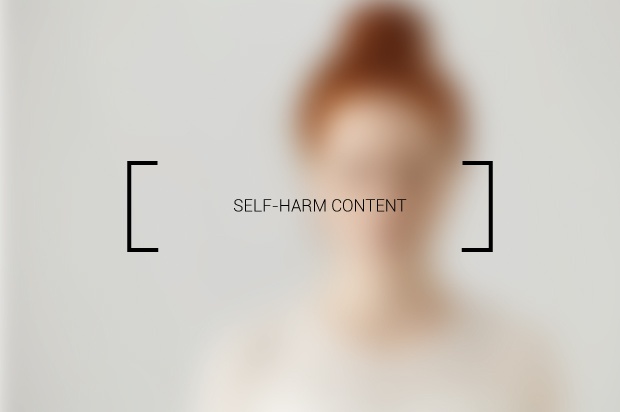We need to talk about online self-harm content
Graphic self-harm content is more accessible than ever. For people who self-harm, this can make recovery even harder.

Harmful imagery is scarily powerful.
Online self-harm content means images, quotes or videos online that refer to self-harm or suicide. Over time, exposure to this graphic content normalises self-harm and in some cases even glamorises it. This can make it even harder for people who self-harm to recover. If you or someone you know self harms or has an issue with harmful online content, we want you to know you’re not alone. It’s never too late to do something about it.
It’s just a picture… isn’t it?
A picture or a quote might sounds pretty harmless but our visual sense is one of our most powerful. Over time, exposure to self-harm content can plant ideas and lead us to believe powerful thoughts. Sound a bit mind-control-y? Well in a way, it is.
Lots of people who self harm turn to the internet because it’s a way to meet other people in a similar situation. Why else do people look for harmful content?
- Shared experience. People who self-harm often feel very alone. It can be a relief to find people online who understand them. It gives them a sense of community and helps them make sense of their self-harming.
- It normalizes self-harm. If someone feels weird or different or guilty about self-harming, seeing other people do it can make them feel more ‘normal’.
- Advice. Some people visit these sites for advice on how to stop self-harming but some people also look for new techniques and advice on things like how to disguise scars.
If any of the reasons above sound familiar to you, please know we’re not judging you. We just want you to understand the dangers of looking at this content.
I think I’m at risk, what should I do?
Recognising you’re at risk from harmful online content and wanting to do something about it is something to be proud of. Here are some ways you can limit your exposure to harmful content:
- Block harmful sites and unfollow accounts that you know share harmful content.
- Reboot your social media by following different, positive accounts. By doing this you’ll fill your feed with positive content, coping strategies, images and messages that are going to raise you up rather than beat you down.
- Seek out online communities of people who are honestly looking to support each other overcome self harm. Support from others is incredibly powerful and can help you refrain from hurting yourself.
- Find an alternative coping strategy. If self-harm or viewing harmful content is your coping strategy for dealing with the way you feel, try distracting yourself with positive alternatives that make you feel good – going for a run, writing a journal or doing something creative can all help. We know this sounds like a massive leap but we have help to get you there. Knowing you are stronger than your triggers can be super empowering.
I need more than that
We get it. Self-harm is rarely something you recover from overnight. It’s like an addiction and when it comes to triggers, it’s unlikely you’ll avoid every scrap of challenging content out there. Having a clean up of your social media is a first, positive step but for long-term recovery, it’s worth exploring:
- Talking to someone you trust. Opening up to a parent, sibling or friend can give you the support you deserve. Read our article on telling someone you self-harm and if talking face to face feels too hard, you could try writing a letter. If you’re still need in a bit of advice, Maddie Bruce has also spoken to us about her own self-harm recovery here.
- Getting expert advice. Organisations such as Childline, Young Minds, The Samaritans and us at The Mix have helplines and chat services dedicated to helping young people access the help they deserve.
- Counselling. If you feel like talking could really help but you don’t feel ready to open up to someone you know, counselling could be helpful. Talk to your GP who will be able to refer you on to a counsellor.
- Boost your self esteem. The better you feel about yourself, the less likely you are to self harm. Read our article on how to build your self-esteem.
Next Steps
- Anyone can contact the Samaritans on their 24-hour helpline to talk things through. 116 123
- selfharmUK provides information and advice about self harm. You can ask a question to their expert panel or share your story.
- You can talk to Childline about anything. Call them for free on 0800 1111 or visit their website.
- Chat about this subject on our Discussion Boards.
By Holly Turner
Updated on 26-Feb-2019
Sorry, comments closed
No featured article














